What'sthe matter
Unit1-what's-the-matter-教材语法解析
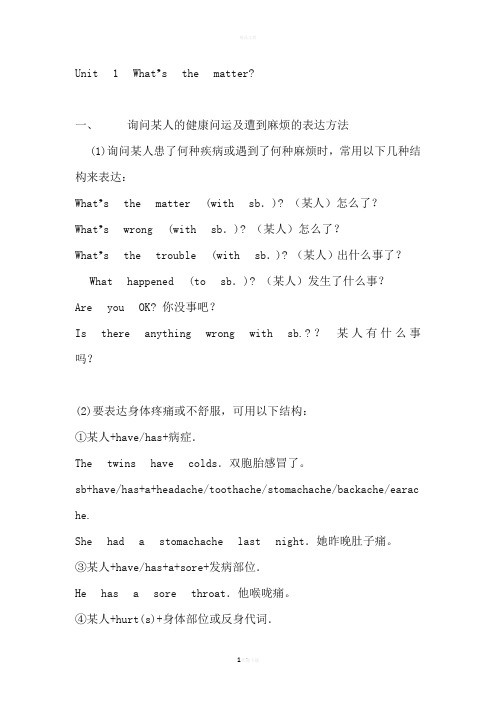
Unit1What’s the matter?一、询问某人的健康问运及遭到麻烦的表达方法(1)询问某人患了何种疾病或遇到了何种麻烦时,常用以下几种结构来表达:What’s the matter(with sb.)? (某人)怎么了?What’s wrong(with sb.)? (某人)怎么了?What’s the trouble(with sb.)? (某人)出什么事了?What happened(to sb.)? (某人)发生了什么事?Are you OK? 你没事吧?Is there anything wrong with sb.??某人有什么事吗?(2)要表达身体疼痛或不舒服,可用以下结构:①某人+have/has+病症.The twins have colds.双胞胎感冒了。
sb+have/has+a+headache/toothache/stomachache/backache/earac he.She had a stomachache last night.她昨晚肚子痛。
③某人+have/has+a+sore+发病部位.He has a sore throat.他喉咙痛。
④某人+hurt(s)+身体部位或反身代词.He hurt his leg.他的腿受伤了。
⑤某部位+hurt(s).My head hurts badly.我头痛得厉害。
⑥某人+have/has +a pain +in one’s+身体部位I have a pain in my chest.我胸口痛⑦(There is)something wrong with one’s+身体部位.There is something wrong with my right eye.我的右眼有毛病。
⑧其他表达方式She has a heart trouble.她有心脏病。
He got hit on the head他头部受到了撞击。
Unit_5_What's_the_matter

Unit 5 What‟s the matter?SectionA1a-Grammar Focus【学习目标】Body names.The names of illness.Talk about your health.【学习重点】Talk about your health. Make suggestions.【导学过程】一.预习检测翻译单词1.事情,问题_________ 2受凉,感冒____________ 3.胃疼,腹疼,肚子疼______________ 4.疼痛的___________5.牙齿______________6.休息______________7.蜂蜜________________ 8.牙医______________9.头疼_____________10.应该_____________短语1.患感冒____________ 2胃痛____________ 3.嗓子疼______________ 4.后背疼___________ 5.牙疼_________________6.躺下休息__________________7.看牙医_____________________ 8.带蜂蜜的热茶_______________9.喝大量的水________________10.发烧________________ 二.自主学习1.What‟s the matter?怎么了?⑴这是人们特别是医生和护士询问病人病情时最常用的问句,常与介词with 连用。
What‟s the matter with you ? 类似的有What‟s wrong (with you) ?/What‟s the trouble (with you)?=What‟s your trouble?/What‟s up?注意:matter前加定冠词the ,wrong 前不加任何修饰词,trouble 前加the或形容词性物主代词。
2014春八年级下册unit1_what‘s_the_matter课文重难点讲解
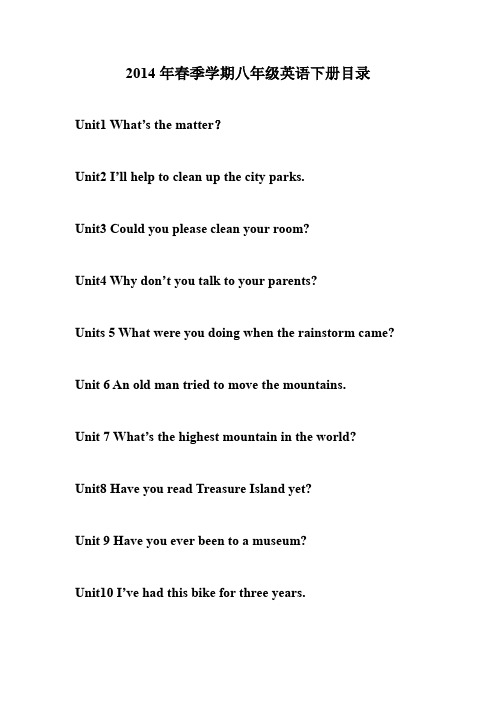
2014年春季学期八年级英语下册目录Unit1 What’s the matter?Unit2 I’ll help to clean up the city parks.Unit3 Could you please clean your room?Unit4 Why don’t you talk to your parents?Units 5 What were you doing when the rainstorm came? Unit 6 An old man tried to move the mountains.Unit 7 What’s the highest mountain in the world?Unit8 Have you read Treasure Island yet?Unit 9 Have you ever been to a museum?Unit10 I’ve had this bike for three years.Unit1 What’s the matter?Section A1. What’ s the matter? 怎么啦?出什么事情了?【解析】matter/ ' mætə(r)) /n.问题;事情What’ s the matter with you?= What’s the trouble with you?= What’ s wrong with you?你怎么了?【注】:matter 和trouble 为名词,其前可加the 或形容词性物主代词,wrong 是adj. 不能加the【2013自贡3】18. —What’s the matter ______ Tom. He is wet through.—His car ran _______ the river.A.with; inB.to; intoC.with; into【用法】用于询问某人有什么病或某人遇到什么麻烦、问题其后跟询问对象时,与介词with连用。
unit1What's -the-matter-知识点及短语
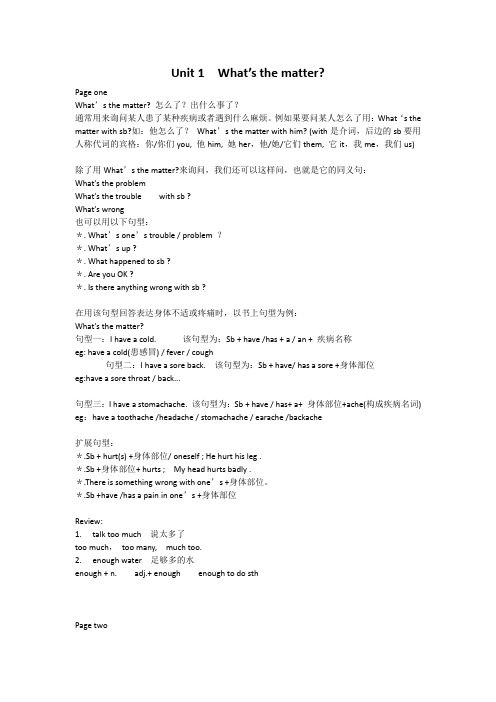
Unit 1 What’s the matter?Page oneWhat’s the matter? 怎么了?出什么事了?通常用来询问某人患了某种疾病或者遇到什么麻烦。
例如果要问某人怎么了用:What‘s the matter with sb?如:他怎么了?What’s the matter with him? (with是介词,后边的sb要用人称代词的宾格:你/你们you, 他him, 她her,他/她/它们them, 它it,我me,我们us)除了用What’s the matter?来询问,我们还可以这样问,也就是它的同义句:What’s the problemWhat’s the trouble with sb ?What’s wrong也可以用以下句型:*. What’s one’s trouble / problem ?*. What’s up ?*. What happened to sb ?*. Are you OK ?*. Is there anything wrong with sb ?在用该句型回答表达身体不适或疼痛时,以书上句型为例:What’s the matter?句型一:I have a cold. 该句型为:Sb + have /has + a / an + 疾病名称eg: have a cold(患感冒) / fever / cough句型二:I have a sore back. 该句型为:Sb + have/ has a sore +身体部位eg:have a sore throat / back...句型三:I have a stomachache. 该句型为:Sb + have / has+ a+ 身体部位+ache(构成疾病名词) eg:have a toothache /headache / stomachache / earache /backache扩展句型:*.Sb + hurt(s) +身体部位/ oneself ; He hurt his leg .*.Sb +身体部位+ hurts ; My head hurts badly .*.There is something wrong with one’s +身体部位。
初中英语八年级What’s the matter 词汇学习
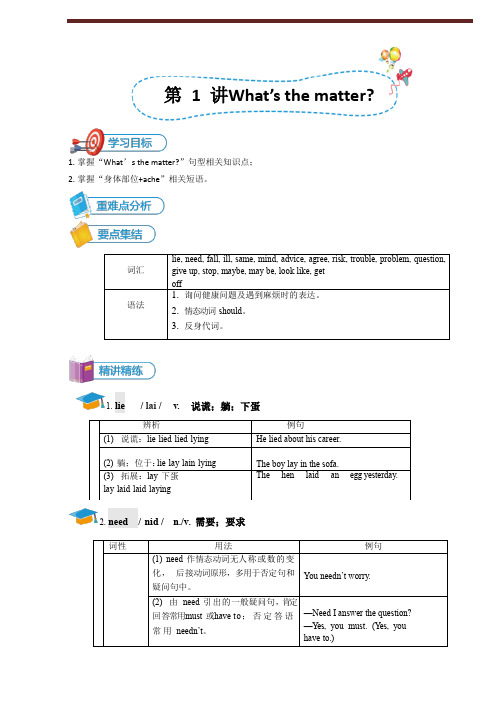
第 1 讲 What’s the matter?1. 掌握“What ’s the matter?”句型相关知识点;2. 掌握“身体部位+ache ”相关短语。
词汇 lie, need, fall, ill, same, mind, advice, agree, risk, trouble, problem, question, give up, stop, maybe, may be, look like, get off语法1. 询问健康问题及遇到麻烦时的表达。
2. 情态动词 should。
3.反身代词。
1. lie / lai / v. 说谎;躺;下蛋2. need / nid / n./v. 需要;要求辨析例句(1) 说谎:lie -lied -lied -lying He lied about his career.(2) 躺;位于:lie -lay -lain -lyin gThe boy lay in the sofa.(3) 拓展:lay 下蛋 lay -laid -laid -layingThe hen laid an egg yesterday.词性 用法例句(1) need 作情态动词无人称或数的变化, 后接动词原形,多用于否定句和疑问句中。
You needn’t worry. (2) 由 need 引出的一般疑问句,肯定回 答 常 用 must 或 have to ;否定答语常用needn’t 。
—Need I answer the question?—Y es, you must. (Y es, you have to.)3.fall/ fɔl /n./v. 下降;跌下(4.mind / maɪnd /n. /v . 理智;介意5.advice / ədˈvaɪs / n.建议;忠告6. risk / rɪsk / n./vt. 风险;冒...的危险give up/8.look like看起来像一)询问健康问题及遇到麻烦时的表达一、What ’ s the matter? 句型matter ,名词,意为“问题;事情”,用于询问他人怎么了,可互换的短语如下 :What ’s the matter(with sb)? What ’s wrong (with sb)? What ’s the trouble (with sb)?/ What ’s one ’s trouble? What happened( to sb)? Are you OK?辨析Is there anything wrong (with sb)?二、要表达身体某一部位疼痛或不舒服sb+have/has+身体部位-ache( headache/toothache…) Eg. She had a stomachache last night.sb+have/has a sore+身体部位Eg. He has a sore throat.sb+hurt(s)+身体部位或反身代词Eg. He hurt his leg.sb+have/has a pain in one’s +身体部位Eg. I have a pain in my chest.There is something wrong with one’s+身体部位Eg. There is something wrong with my right eye.拓展have a/an + 疾病名词“患……病” (cold/fever/cough) have a sore throat 患喉咙痛have a sore back患背痛have a fever 发烧have a cold =catch a cold患感冒have a stomachache 患胃痛have a toothache 患牙痛have a headache 患头痛have a backache 患背痛二)情态动词shouldShould 是情态动词,意为“应该;应当”其后接动词原形,无人称和数的变化。
牛津少儿英语二册Unit 2 What's the matter

29.farmer /`fɑ:mə / 农民 他们是农民。 They are farmers. (对划线部分提问) Who are they? 他们是老师。 They are teachers. (对划线部分提问) Who are they? 30.student /`stju:dənt / 学生 我是一个学生。 I am a student.(否定句) I am not a student.
15.better /`betə / 更好的 变得更好 get better 16.soon / su:n / 不久 赶快好起来。 Get better soon. 17.thanks / θæŋks / 谢谢 =thank you 回答:You are welcome.
习题:排序 A: I’m sick. B: Get better soon. C: Hi, John! What’s the matter? D: That’s too bad. E: Thanks. 1.C 2.A 3.D 4.B 5.E
31.police / pə`li:s / 警察 男警察policeman 女警察policewoman 32.officer /`ɒfɪsə / 官员 一个官员 an officer 警察官员 police officer 我的爸爸是一位警察官员。 My father is a police officer.
28.nurse /nɜ:s / 护士 她是一个护士。 She is a nurse. Is she a nurse? Yes, she is. / No, she isn’t. 他是一个老师。 He is a teacher. Is he a teacher? Yes, he is. / No, he isn’t.
unit1what's the matter单元知识总结
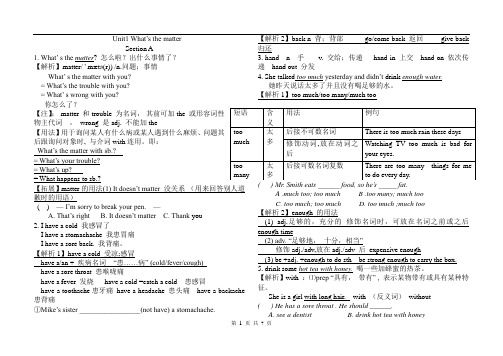
Unit1 What’s the matterSection A1. What’ s the matter? 怎么啦?出什么事情了?【解析】matter/ ' mætə(r)) /n.问题;事情What’ s the matter with you?= What’s the trouble with you?= What’ s wrong with you?你怎么了?【注】:matter 和trouble 为名词,其前可加the 或形容词性物主代词,wrong 是adj. 不能加the【用法】用于询问某人有什么病或某人遇到什么麻烦、问题其后跟询问对象时, 与介词with连用。
即:What’s the matter with sb.?= What’s your trouble?= What’s up?= What happens to sb.?【拓展】matter的用法(1) It doesn’t matter 没关系(用来回答别人道歉时的用语)( ) —I’m sorry to break your pen. —_______A. That’s rightB. It doesn’t matterC. Thank you2. I have a cold 我感冒了I have a stomachache 我患胃痛I have a sore back. 我背痛。
【解析1】have a cold 受凉;感冒have a/an + 疾病名词“患……病” (cold/fever/cough)have a sore throat 患喉咙痛have a fever 发烧have a cold =catch a cold 患感冒have a toothache患牙痛have a headache 患头痛have a backache 患背痛①Mike’s sister _________________(not have) a stomachache.【解析2】back n 背;背部go/come back 返回give back 归还3.hand n 手v. 交给;传递hand in 上交hand on 依次传递hand out 分发4. She talked too much yesterday and didn’t drink enough water.她昨天说话太多了并且没有喝足够的水。
Unit 1 What's the matter?

Unit1What's the matter?本单元单词:matter[ˈmætə(r)]n.问题;事情What's the matter?怎么了?出什么事了?sore[sɔ:(r)]adj.疼痛的;伤痛的have a cold感冒stomachache['stʌməkeɪk]n.胃痛;腹痛have a stomachache胃痛foot[fʊt]n.脚;足neck[nek]n.颈;脖子stomach[ˈstʌmək]n.胃;腹部throat[θrəʊt]n.咽喉;喉咙fever[ˈfi:və(r)]n.发烧lie[laɪ](lay[leɪ])v.躺;平躺lie down躺下rest[rest]v.&n.放松;休息cough[kɒf]n.&v.咳嗽X-ray[ˈeks reɪ]n.X射线;X光toothache[ˈtu:θeɪk]n.牙痛take one's tempreture量体温have a fever发烧break[breɪk]n.间歇;休息take breaks(take a break)休息hurt[hɜ:t](hurt[hɜ:t])使疼痛;受伤passenger[ˈpæsɪndʒə(r)]n.乘客;旅客off[ɒf]adv.&prep.离开(某处);不工作;从…去掉get off下车onto[ˈɒntu]prep.向;朝trouble[ˈtrʌbln.问题;苦恼hit[hɪt](hit[hɪt])(用手或器具)击;打right away立即;马上get into陷入;参与herself[hɜ:ˈself]pron.(she的反身代词)她自己bandage[ˈbændɪdʒ]n.绷带v.用绷带包扎press[pres]v.压;挤;按sick[sɪk]adj.生病的;有病的knee[ni:]n.膝盖;膝nosebleed[ˈnəʊzbli:d]n.鼻出血breathe[bri:ð]v.呼吸sunburned[ˈsʌnbɜ:nd]adj.晒伤的ourselves[,aʊəˈselvz]pron.(we的反身代词)我们自己climber[ˈklaɪmə(r)]n.登山者;攀登者be used to习惯于…;适应于…risk[rɪsk]n.&v.危险;风险;冒险take risks(take a risk)冒险accident[ˈæksɪdənt]n.交通事故kilo[ˈki:ləʊ](=kilogram)n.千克;公斤rock[rɒk]n.岩石run out of用尽;耗尽knife[naɪf]n.(pl.knives[naɪvz])刀cut off切除blood[blʌd]n.血mean[mi:n](meant[ment])v.意思是;打算;意欲get out of离开;从…出来importance[ɪmˈpɔ:tns]n.重要性;重要decision[dɪˈsɪʒn]n.抉择;决定control[kənˈtrəʊl]n.&v.限制;约素;管理be in control of掌管;管理spirit[ˈspɪrɪt]n.勇气;意志death[deθ]n.死亡give up放弃nurse[nɜ:s]n.护士Judy['dʒu:di]朱迪(女名)Nancy[ˈnænsi]南希(女名)Mandy['mændɪ]曼迪(女名)Aron['erən]Ralston['rɔ:lstən]阿伦·罗尔斯顿Utah['ju:ta:]犹他州(美国)重点单词详解:1.matter n.问题;事情短语:what's the matter常用于询问某人患了何种疾病,遇到了什么困难、烦恼或周边出了什么状况等该句型也可用于询问某物出了什么故障,其后可接with sb./sth.表示“某人/某物怎么了?”。
- 1、下载文档前请自行甄别文档内容的完整性,平台不提供额外的编辑、内容补充、找答案等附加服务。
- 2、"仅部分预览"的文档,不可在线预览部分如存在完整性等问题,可反馈申请退款(可完整预览的文档不适用该条件!)。
- 3、如文档侵犯您的权益,请联系客服反馈,我们会尽快为您处理(人工客服工作时间:9:00-18:30)。
一、完形填空从A、B、C、D中选出能填入短文中相应空白处的最佳答案。
(10分)It’s never easy to admit(承认) you are in the wrong. We all 51__ to know the art of apology(道歉).Think how often you have done wrong. Then count how many 52__ you have expressed clearly you were 53___. You can’t go to bed with an easy mind if you do 54__ about it.A doctor friend, Mr. Lied, told me about a man who came to him with diffident kinds of signs: headaches, heart trouble and insomnia (失眠症). 55__some careful exams, Mr. Lied found nothing wrong with him and said, “If you don’t tell me what’s 56___ you, I can’t help you.”The man admitted he was cheating (骗取) his brother to his inheritance (遗产). Then and there the clever doctor 57___ the man write to his brother and 58___ his money. As soon as the letter was put into the post box, the man suddenly cried, “ Thank you,” he said to the doctor “ I think I have got well.”An apology can not only save a broken relationship (关系), but also make a person 59___ . If you can think of someone who should be 60__ an apology from you, do something about it right now.1. A. decide B. have C. need D. try2. A. mistakes B. people C. ways D. times3. A. sorry B. weak C. sad D. wrong4. A. something B. anything C. nothing D. everything5. A. Before B. After C. Till D. Since6. A. hurting B. hanging C. touching D. worrying7. A. made B. helped C. let D. saw8. A. give B. keep C. return D. send9. A. happy B. glad C. strong D. healthy10. A. received B. given C. known D. forgotten二、阅读理解从A、B、C、D中选出最佳答案。
(5分)“An apple a day keeps the doctor away.” Well, milk may work in the same way!Milk is the natural food for mammalian(哺乳动物) babies. It helps them grow strong because it is rich in protein(蛋白质), calcium(钙) and vitamins. Milk can also help you sleep better because it calms you down.But remember to drink milk with care. Find out how old the milk is. Make sure it is fresh and hasn’t gone bad. Don’t drink milk when your stomach is empty. Eat some bread or corn at the same time. That’ll help you take in more protein and vitamins.Doctors say teens need at least 500ml of milk a day. That’s two or three cups. Mi lk-drinking started long ago, as early as 6,000-8,000BC. At that time people started to keep cows, sheep and goats to get their milk. Of course what you drink today isn’t that fresh from the cow. People cool the fresh milk down to 40C to stop the bacteria(细菌)growing. In factories, milk is pasteurized(灭菌) to stop it growing bad. After disinfections(消毒) and packaging, it goes to the supermarkets. Yoghourt also comes from milk. People make some special bacteria to change the taste of milk and make the nutrients(营养) in it easier for people to take in. Maybe that’s why it’s getting more popular with people!1. Milk helps people grow strong because it is rich in ________.A. CalciumB. proteinC. vitaminsD. A, B and C2. The sentence “An apple a day keeps the doctor away.” tells us that________.A .the doctor likes to eat apples every dayB. the doctor doesn’t like apples at allC. the doctor eats an apple each dayD. apples are good for our health3. When you drink milk , you’d better________.A. find out when the milk was producedB. make sure it’s fresh and hasn’t gone badC. not drink milk when your stomach is emptyD. do all of the above4. Why is it better to eat some bread or corn while drinking milk ?A. Our body can take in more protein and vitamins in this way.B. That’ll help us grow taller and stronger.C. That’ll help us taste milk better.D. We’ll still feel hungry without eating some bread or corn.5. Which of the following statements is true ?A. One cup of milk is good enough for teens each day.B. Drinking milk is likely to make teens sleepy.C. To stop the bacteria growing , people cool the fresh milk down to 40C.D. Yoghourt is one kind of milk which has gone bad三、动词应用可适当填加助动词或情态动词。
(10分)I love traveling in the country, but I 66__ (not like) losing my way. I went on a trip recently, but it 67_ (take) me longer than I expected.“I 68_ (go) to Wood ford Green,” I said to the conductor as I 69_ (get) on the bus, “I’ll tell you where 70__ (get) off,” answe red the conductor.I sat in the front of the bus 71__(get) a good view of the countryside. After some time, the bus stopped. 72_ (look) around, I realized with a shock that I was the only passenger left on the bus. “You 73_ (have) to get off here,” the conductor said. “This is as far as we go.” “Is this Wood ford Green?” I asked. “Oh ,dear,” said the conductor suddenly, “I 74_ (forget) to put you off.”“It doesn’t matter,”I said, “I’ll get off here.”“We’re going back now,”said the conductor. “Well, in this case (既然这样), I prefer 75__ (stay) on the bus,”I answered.66___________ 67_____________68___________ 69_____________70____________ 71_____________72_____________ 73_____________74_____________ 75_____________When I was about 12,a girl in my class liked to point out (指出)my problems. I was too thin;I wasn’t a good student;I talked too much;I was too proud (骄傲),and so on. At last,I became very angry and ran to my father.He listened to me quietly. Then he asked, “Are these things true or not? Do you know what you are really like? Go and make a list of what she said and find the things that are true. ”I did as he told me. To my great surprise, I discovered (发现)that about half of the things were true. Some of them I couldn’t change (改变)(like being very thin). But there were things I could and wanted to change. For the first time, I got a clear picture of myself.I brought the list back to Dad. He didn’t take it, “That’s just for you,”he said “You knowthe truth (真相)about yourself better than anyone else. When people say something that is true about you,you should find it helpful. ’,Our world is full of people who think they know your matter. Don’t be angry and feel hurt. Listen to them.根据短文内容,判断正(T)误(F)。
